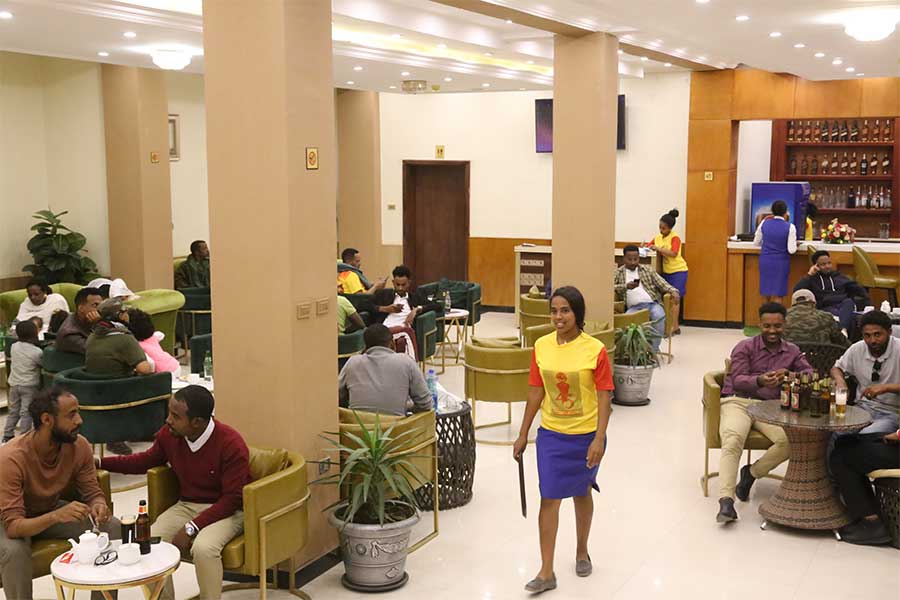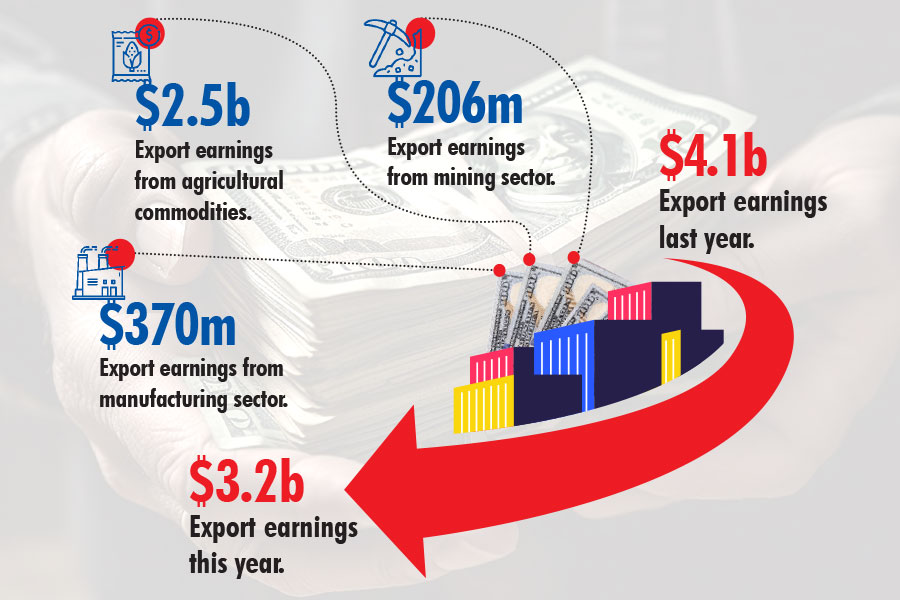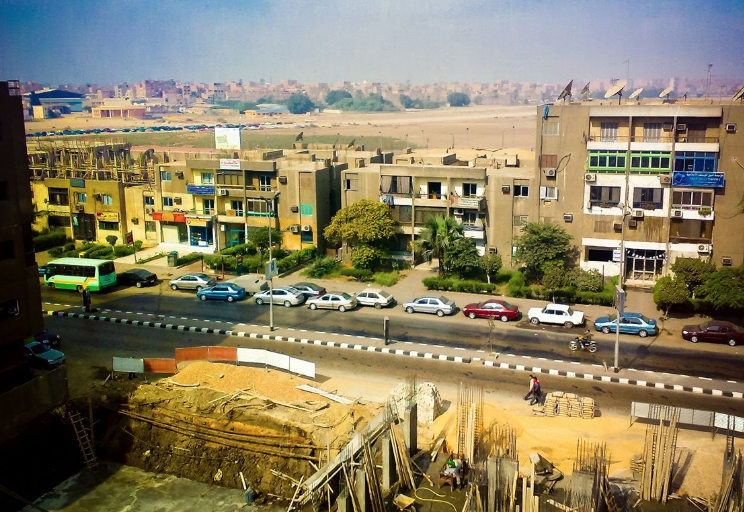
Fortune News | Jan 05,2019
A kaleidoscopic butterfly on a large white flag had adorned the Bira Biro Festival venue at Ghion Hotel for three consecutive years since 2017. The music event, named after the Amharic word for "butterfly," runs from midday to midnight with thousands in attendance at the lush gardens of the Hotel, which opened its doors in the early 1950s. Local and international musicians perform surrounded by 3D projection lights that come alive at night. For Guta Wakuma, managing director of Choo Choo Promotions, the company behind the event, it was the realisation of a dream.
"I love music. That's why I ventured into this business," he said. "I wanted to create a platform where musicians can get a bigger stage; where people can see international artists at home."
The event business had not been without its challenges even before the advent of the Novel Coronavirus (COVID-19). Unrest in the country has led to events being cancelled overnight. Months of preparation can be rescinded without a day's notice, leaving organisers to deal with the aftereffects of cancellations. But nothing could have prepared Guta and others in the industry for what the pandemic brought.
"I really thought my event organising days were over," he said. "There was no sense of direction, and we didn't know when it would be over."
As time progressed, he shifted the company's platform online, streaming some web and television events. Managing artists and producing their albums kept him busy in an otherwise quiet and boring time. Persistence, however, has paid off for his team, as the passing of time brought with it a slackening of measures in regard to the pandemic. Now, events are underway, albeit at half capacity.
"We're working with sponsors on how to execute the events safely," he said. "We have to find new ways to move forward."
The industry needs to be versatile, added Guta, and operate with many platforms. The freeze on events had not only impacted event organisers but almost everyone in the industry. Kolya Manufacturing, an optical disc manufacturing firm, had also seen its fair share of struggles before the pandemic.
The wide use of digital spheres for getting music was threatening the survival of selling CDs, according to the company's shareholder and former CEO, Yared Ademe.
"Online music platforms and messaging apps had made music readily available to users," he said.
Blockades due to unrest made the distribution of CDs to the other regions of the country impossible. On top of this, the company, which operates with 32 employees, came to a standstill following the pandemic. Musicians stopped releasing new music, events were banned, and it had seemed like their CD selling days had really come to an end. In brighter times, the company was selling up to 300,000 CDs for local artists like Teddy Afro and Abiy Lakew.
"Music isn't an essential business," he said. "That is why it was the first to go."
The business outlook in the country rarely factors in future possibilities; it takes things for granted, according to him. As one solution to the crisis, Kolya Manufacturing partnered with Efanos, publishers of educational books and materials in the country. With the closure of schools and students expected to continue their education from their homes, publishing CDs with educational content served another purpose. It had found a lifeline as a result of the pandemic itself.
The very lifeline that had provided the company with another shot in the market is the reason Emeshaw Kefalegn, a teacher in Mezezo Elementary School in Mezezo Wereda, Amhara Regional State, spent the past eight months at home. He served 19 years as a teacher, going between his hometown in Mezezo and a few years in northern Gonder. Teaching for as long as he did means he has seen his fair share of ups and downs.
Describing notable hardships from his teaching years, Emeshaw mentioned famine in the Gonder area and the consequential student dropouts. Another has been the migration of students to Arab countries where many would journey to find better-paying jobs. Despite that, he maintains that this year has still been the hardest since he started a career in this field.
"There was a sense of hopelessness," he said. "When we heard about the devastating effects [of the pandemic] in developed countries, we were terrified to think of what would happen here."
Staying at home at all times was difficult, but it was spent drinking coffee, reading books and talking with his family of four.
"My children were reading books most of the time," he said. "I spent a lot of money on books this year."
In November, the Ministry of Education announced that schools were to be reopened with precautionary steps. He joined teachers at the schools in preparing water taps for washing and disbursing reusable masks to the students.
Though there have been no positive cases in their surrounding area, Emeshaw does not believe that the worst is over yet. He worries about his daughter, who is scheduled to return to school far from home, and the news of recent sanctions regarding the second wave of the pandemic in the media.
"We have to follow what the health professionals are asking and hope for the best," he said.
Though there is still fear in the community, most students have rejoiced at the return to normalcy. This includes the children of Abebe Challa, a civil servant at the Ministry of Finance. Like many other government institutions in the country, their Ministry had ordained half of its employees to stay home when the pandemic took hold.
The general social atmosphere at work was upturned. The cafeteria where most employees have lunch, usually abuzz with laughter and chit chat, died down. Five or six people surrounding the circular tables and catching up on work and life as they ate quickly became a forgotten scene from another era; using the shared water jugs on most tables, unthinkable.
"Most of us there are friends, not just colleagues," said Abebe, who had worked at the Ministry for nearly 40 years. "We went to each other's birthdays, graduations, weddings, whatever it was."
Perhaps this situation has its own good side, stated Abebe.
"People have stopped throwing expensive celebrations," he said. His children in the meantime have turned to sports, engineering dumbbells from cement and convincing him to install WiFi in their home.
"I told them it would cost a lot of money," he said. "But they asked me to use the money I would have otherwise spent on their school, and I couldn't argue with that."
Telecom services had been one of the few businesses that had seen more demand during the pandemic, along with soap and sanitiser, which people scrambled to get in the early days of the pandemic. Companies like Merry Chemicals have experienced both the plummeting of certain markets and the rise of others first hand. As distributors of chemicals used in multiple sectors such as liquor, mining, and detergent industries, their own sales had balanced out.
Beverage companies had tanked at the time, taking their need for processing chemicals with them, according to Leager Minwuyelet, managing director of the company. On the other hand, business from soap and detergent companies had never been that high, with some unable to keep up with the demand. Events over the second half of the year, including open conflict and disruptions to a newly transitioning government, had graver consequences.
The cutoff to Tigray Regional State due to the war ended in a logistical nightmare where the company had to store volatile chemicals instead of sending them out to mining companies in the region. Unexpected warehousing costs along with bureaucratic and corrupt practices at government offices were all salient features of the past year.
"The instability in the country has left us unprotected and at the mercy of hooligans," he said. "We've resorted to making payments to ensure that our business doesn't suffer when riots take place."
The scarcity of forex had also meant the company had to spend an extra 100 million Br in the black market to import chemicals.
"It has been a hectic year," he said. "And it's going to be a very dark time ahead if the government doesn't intervene."
The year has been mixed on all fronts. While some incidents, like the filling of the Great Ethiopian Renaissance Dam, have triggered a sense of hope, others like the open conflict in the northern part of the country have diminished it, according to Abebaw Minaye (PhD), assistant professor at Addis Abeba University and a member of the Ethiopian Psychologists Association.
The political sphere of the country has also created division, he explained. "Is it a fracturing or the calm before the storm, the shaking of a freshly built foundation?" he pondered.
"Recurrent news about deaths has created a pessimistic outlook," he said. "People have also been forced to stop work, both physically and mentally."
For many, the recent outbreak of warfare in the northern part of the country has been the straw that broke the camel's back.
"When a disaster comes around, people reassure themselves that it will pass," Abebaw said. "But when it's one thing after the other, they tend to get desperate."
This also impacts the productivity of people as they feel insecure about the future, he added. De-motivation for work, sleeplessness, and trauma are common effects.
There needs to be a greater effort to create community awareness on motivation based on experience and evidence, recommended the expert. Abebaw cited the United States Civil War of the 1860s and Germany's reunification as examples of nations overcoming very trying times.
"The idea of creative destruction is a deliberate destruction that paves the way for a better existence," he said. "Remembering that the country is going through birth pangs is important," he said.
The work put in now will also stand the test of time, he added.
PUBLISHED ON
Jan 02,2021 [ VOL
21 , NO
1079]

Fortune News | Jan 05,2019

Agenda | Feb 22,2020

Commentaries | Apr 17,2021

Advertorials | Jun 05,2023

Commentaries | Nov 27,2018

Fortune News | Jul 01,2023

Editorial | Sep 23,2023

Fortune News | Jun 08,2019

Commentaries | Aug 06,2022

Commentaries | Feb 24,2024

Dec 22 , 2024 . By TIZITA SHEWAFERAW
Charged with transforming colossal state-owned enterprises into modern and competitiv...

Aug 18 , 2024 . By AKSAH ITALO
Although predictable Yonas Zerihun's job in the ride-hailing service is not immune to...

Jul 28 , 2024 . By TIZITA SHEWAFERAW
Unhabitual, perhaps too many, Samuel Gebreyohannes, 38, used to occasionally enjoy a couple of beers at breakfast. However, he recently swit...

Jul 13 , 2024 . By AKSAH ITALO
Investors who rely on tractors, trucks, and field vehicles for commuting, transporting commodities, and f...

Jun 28 , 2025
Meseret Damtie, the assertive auditor general, has never been shy about naming names...

Jun 21 , 2025
A well-worn adage says, “Budget is not destiny, but it is direction.” Examining t...

Jun 14 , 2025
Yet again, the Horn of Africa is bracing for trouble. A region already frayed by wars...

Jun 7 , 2025
Few promises shine brighter in Addis Abeba than the pledge of a roof for every family...